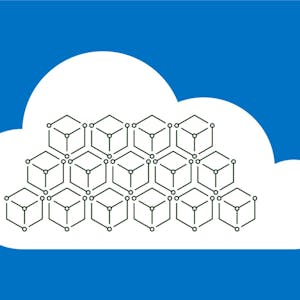Introduction to Containers w/ Docker, Kubernetes & OpenShift
After completing this course, you will be able to build applications in a cloud native way using containerization tools and technologies, and deploy your applications in any public, private or hybrid cloud at incredible scale. This course introduces you to containers and explains how containers differ from virtual machines. It also covers the importance of containers in cloud computing, as well as the emerging ecosystem of related technologies such as Docker, Kubernetes, Red Hat OpenShift, and Istio.Throughout the course you will apply what you learn with hands-on labs. From getting started with Docker, to orchestration and scaling with Kubernetes, and simplifying deployments with OpenShift. The labs are performed using your web browser on IBM Cloud and Skills Network Labs environments, that are made available to you at no charge. in the project at the end of the course you will build a container image and deploy and scale it on Cloud using OpenShift.
Containerization is likely the most significant invention in IT since the introduction of virtualization. Open source projects like Kubernetes and products like Red Hat OpenShift have become standards for people looking to deploy and manage containers at scale. Everyone from small startups to large multinational corporations is transitioning to these technologies, and they are looking for people who are skilled in these areas.
This course is of interest to anyone who wants to be a cloud practitioner - cloud developers, cloud architects, cloud system engineers, devops engineers, cloud networking specialists and many other roles. The material also serves the needs of those who perform the tasks of advising, consulting, building, moving and managing cloud solutions.
There are no hard requirements needed to be able to take this course other than basic computer literacy, and a foundation level understanding of Cloud Computing.
Understand the benefits of containers
Build and run a container image
Understand Kubernetes architecture
Write a YAML deployment file
Syllabus
Syllabus - What you will learn from this course
Week 1
Understanding the Benefits of Containers
Week 2
Understanding Kubernetes Architecture
Week 3
Managing Applications with Kubernetes
Week 4
The Kubernetes Ecosystem: OpenShift, Istio, etc.
Week 5
Final Assignment
FAQ
When will I have access to the lectures and assignments?
Access to lectures and assignments depends on your type of enrollment. If you take a course in audit mode, you will be able to see most course materials for free. To access graded assignments and to earn a Certificate, you will need to purchase the Certificate experience, during or after your audit. If you don't see the audit option:
What will I get if I subscribe to this Certificate?
When you enroll in the course, you get access to all of the courses in the Certificate, and you earn a certificate when you complete the work. Your electronic Certificate will be added to your Accomplishments page - from there, you can print your Certificate or add it to your LinkedIn profile. If you only want to read and view the course content, you can audit the course for free.
Reviews
A very good introductory course, but there are little problems in lab sessions.
Awesome course for beginners and intermediate developers to gain knowlege on container technology
The Course represents a good starting point for everyone who want to use containers, however, i think it could be better if there were more hands on labs.
It is very good introduction and some hands-on experience course for the beginners.
